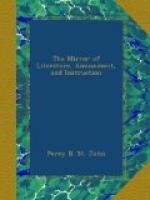“Gray’s Inn is a place of great antiquity: it was originally the residence of the Lord Grays, from the year 1315, when John, the son of Reginold de Grey, resided here, till the latter end of the reign of Henry the Seventh, when it was sold, by Edmund Lord Grey, of Wilton, to Hugh Dennys, Esq., by the name of Portpole; and in eight years afterwards it was disposed of to the prior and convent of Shene, who again, disposed of it to the students of the law; not but that they were seated here much earlier, it appearing that they had leased a residence here from the Lord Grays, as early as the reign of Edward the Third. Chancery Lane gapes on the opposite side, to receive the numberless malheureuses who plunge unwarily on the rocks and shelves with which it abounds.”
P.T.W.
[2] From Lord Scroops, of Bolton.
* * * * *
ANCIENT SLAVERY IN ENGLAND.
(For the Mirror.)
“O Freedom! first delight of human kind.”
DRYDEN.
Sharon Turner, in his interesting “History of the Anglo-Saxons,” says, “It was then (during the reign of Pope Gregory I.) the practice of Europe to make use of slaves, and to buy and sell them; and this traffic was carried on, even in the western capital of the Christian Church. Passing through the market at Rome, the white skins, the flowing locks, and beautiful countenances of some youths who were standing there for sale, interested Gregory’s sensibility. To his inquiries from what country they had been brought, the answer was, from Britain, whose inhabitants were all of that fair complexion. Were they Pagans or Christians? was his next question: a proof not only of his ignorance of the state of England, but also, that up to that time it had occupied no part of his attention; but thus brought as it were to a personal knowledge of it by these few representatives of its inhabitants, he exclaimed, on hearing that they were still idolaters, with a deep sigh, ’What a pity that such a beauteous frontispiece should possess a mind so void of internal grace.’ The name of their nation being mentioned to be Angles, his ear caught the verbal coincidence—the benevolent wish for their improvement darted into his mind, and he expressed his own feelings, and excited those of his auditors, by remarking—’It suits them well: they have angel faces, and ought to be the co-heirs of the angels in heaven.’
“The different classes of society among the Anglo-Saxons were such as belonged to birth, office, or property, and such as were occupied by a freeman, a freedman, or one of the servile description. It is to be lamented in the review of these different classes, that a large proportion of the Anglo-Saxon population was in a state of abject slavery: they were bought and sold with land, and were conveyed in the grants of it promiscuously with the cattle and other property upon it; and in the Anglo-Saxon wills,




